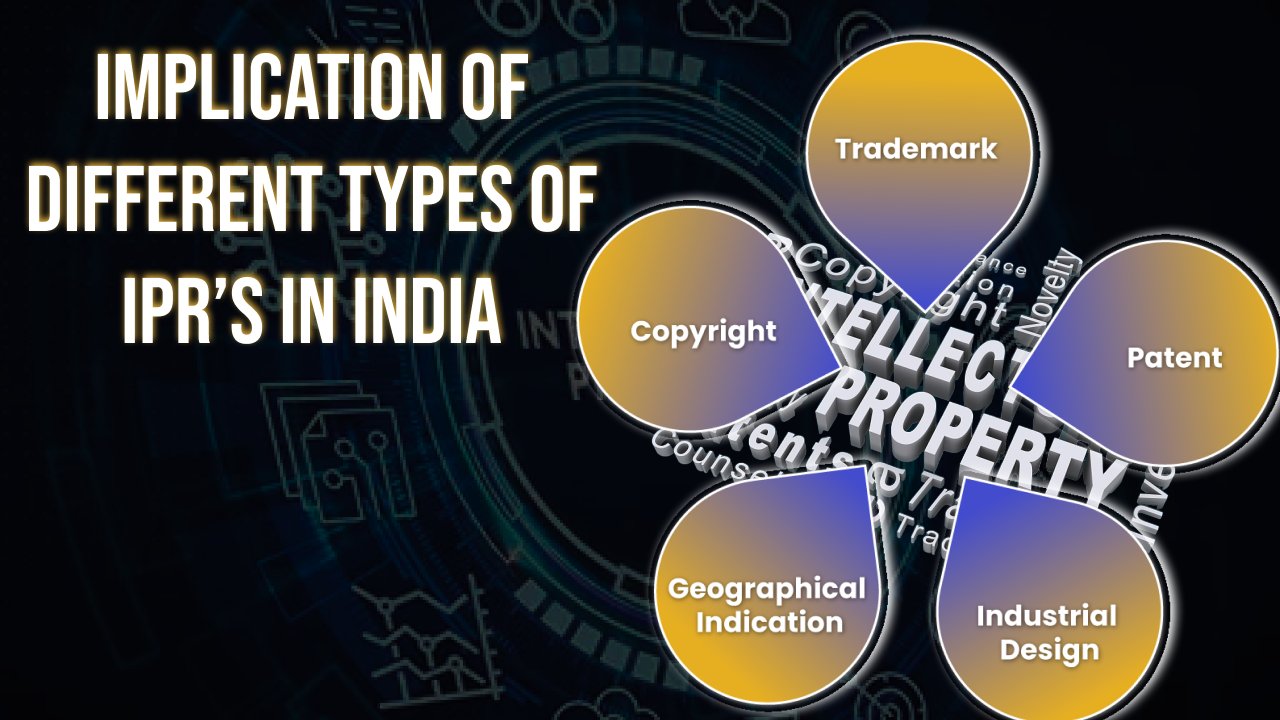Implication of Different Types of IPRs In India
Intellectual Property Rights (IPRs) play a crucial role in fostering innovation and creativity in any economy. In India, the implications of different types of IPRs are vast and varied, influencing industries, businesses, and individual inventors. This article delves into the multifaceted world of IPRs in India, exploring the significance of patents, copyrights, trademarks, and trade secrets. We examine the impact of these rights on innovation, economic development, and societal progress. Additionally, the article sheds light on recent developments, challenges, and the evolving landscape of IPRs in India.

Introduction:
Intellectual Property Rights (IPRs) serve as the bedrock of innovation and creativity, providing legal protection to inventors, creators, and businesses. In India, a rapidly growing economy, the implications of different types of IPRs are becoming increasingly significant. Patents, copyrights, trademarks, and trade secrets form the cornerstone of IPRs in India, each playing a unique role in shaping the country's innovation ecosystem.
Patents in India:
Patents serve as a powerful tool for protecting inventions and encouraging technological advancement. In India, the patent regime has undergone substantial changes over the years to align with global standards. The granting of patents stimulates research and development, fostering a culture of innovation. However, challenges such as the backlog of patent applications and the need for stringent examination processes persist.
The pharmaceutical industry in India, a major player in the global market, has been deeply affected by patent issues. The balance between protecting intellectual property and ensuring access to affordable medicines remains a contentious issue. The introduction of product patents in the pharmaceutical sector has led to increased foreign investments but has also sparked debates on the accessibility of life-saving drugs.
Copyrights and Creative Industries:
Copyrights are crucial for safeguarding the rights of creators in the literary, artistic, and entertainment fields. In India, the film and music industries, among others, heavily rely on copyright protection. With the rise of digital platforms, issues such as online piracy and unauthorised use of copyrighted material have become significant challenges.
The implications of copyright extend beyond the entertainment sector. Software development, a burgeoning industry in India, relies on robust copyright protection. Striking a balance between protecting software innovations and fostering a collaborative environment for developers remains a constant challenge.
Trademarks and Branding:
Trademarks are integral to brand recognition and consumer trust. India has witnessed a surge in the importance of trademarks, with businesses recognizing the value of building strong brand identities. The registration and protection of trademarks ensure that consumers can identify and trust the products or services associated with a particular brand.
The e-commerce boom in India has further emphasised the need for robust trademark protection. Online marketplaces, where numerous brands coexist, require effective mechanisms to prevent counterfeiting and protect the reputation of genuine brands. The implications of trademarks are not limited to business; they extend to consumers who rely on them for informed decision-making.
Trade Secrets and Confidential Information:
While patents, copyrights, and trademarks focus on publicly protecting intellectual property, trade secrets operate in a more discreet manner. Trade secrets encompass confidential business information, processes, and practices that provide a competitive advantage. The implications of trade secrets in India are vast, particularly in industries such as technology and manufacturing.
India's evolving startup ecosystem heavily relies on safeguarding trade secrets. As young companies strive for innovation, maintaining confidentiality becomes paramount. The legal framework around trade secrets is continually developing to address emerging challenges and to ensure fair competition.
Challenges and Recent Developments:
Despite the advantages of IPRs, India faces challenges in balancing the interests of innovators, consumers, and the public. The backlog of patent applications, the need for more efficient enforcement mechanisms, and the constant evolution of technology pose ongoing challenges. Additionally, striking a balance between encouraging innovation and ensuring access to essential goods and services remains a delicate task.
Recent developments, such as the National Intellectual Property Rights Policy and amendments to existing laws, signal India's commitment to fostering a robust IPR environment. The government's initiatives aim to streamline processes, reduce pendency, and enhance the overall protection of intellectual property.
Conclusion:
In conclusion, the implications of different types of IPRs in India are far-reaching and complex. Patents drive innovation in technology, copyrights protect creative works, trademarks build brand value, and trade secrets foster a competitive edge. The delicate balance between protecting intellectual property and ensuring accessibility to essential goods and services requires ongoing attention.
As India continues to position itself as a global player in innovation and economic development, the effective implementation and enforcement of IPRs become crucial. The evolving landscape of IPRs in India, marked by recent policy developments and legal amendments, demonstrates a commitment to creating an environment that encourages creativity, protects inventors and creators, and fosters sustainable economic growth. Striking this delicate balance will be key to unlocking the full potential of India's intellectual capital in the global arena.












